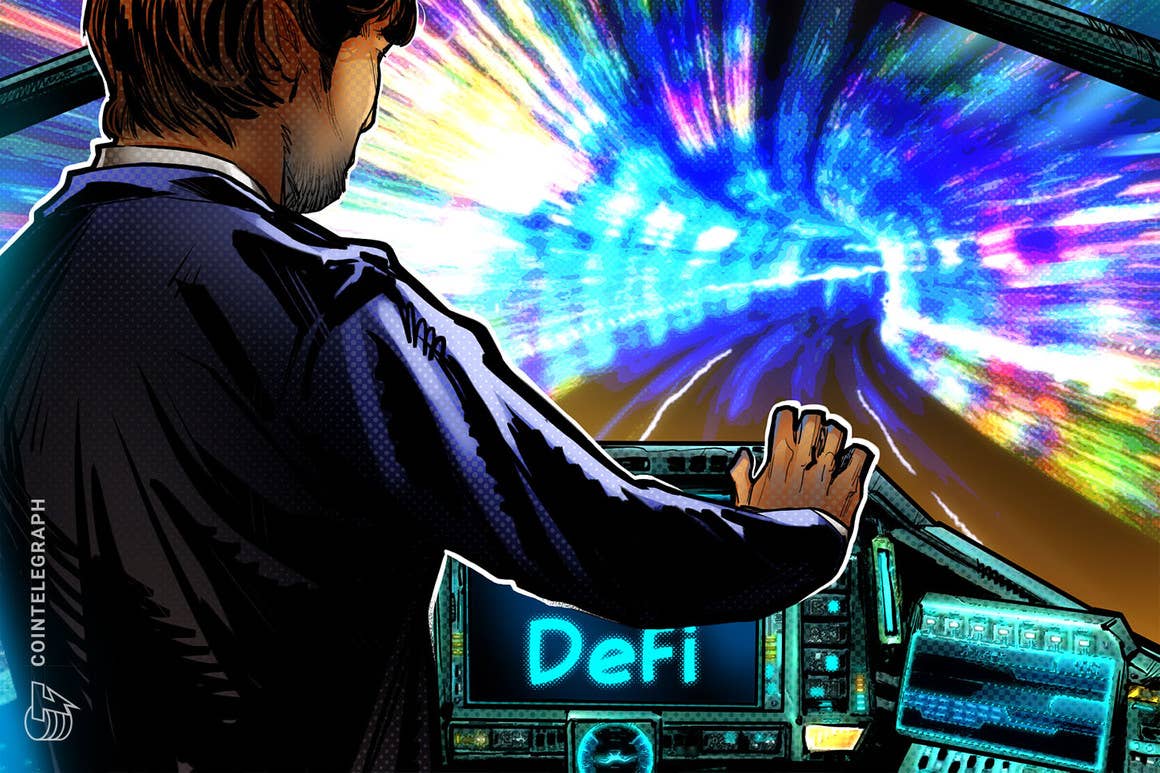Hold onto your hats, boys and girls! It’s a new world — a financial system without intermediaries, that anyone can access 24 hours a day with only

Hold onto your hats, boys and girls! It’s a new world — a financial system without intermediaries, that anyone can access 24 hours a day with only a mobile phone and a wallet! As Julien Bouteloup said to me:
“In DeFi, what we are building is fully decentralised technology, fully transparent, run by mathematics. No one can beat that.”
He continued: “We are building on research papers, 40 years of research, fundamental research, discrete mathematics being built and put on-chain that no one can beat. You cannot beat that. GitHub didn’t exist in the ‘90s. First, the fact that we’re going at the speed of light, is because everything is open source, and everyone can participate.”
Related: DeFi literacy: Universities embrace decentralized finance education
A Novum Insights report stated back in August that since 2020, the DeFi market has grown by a factor 40, with the total value locked in DeFi at around $61 billion at the time (while the current TVL stands at around $165 billion). Stablecoins’ capitalization, an important part of DeFi, grew in the first half of 2021 to $112 billion.
Massive gains are being made but, at the same time, DeFi investors are also losing money because DeFi is not regulated, moderated, intermediated, hosted or validated by a central authority, only driven by smart contracts. So if a smart contract fails or is attacked, consumers have no remedy. Loretta Joseph, global digital asset regulatory expert, said to me: “Regulators protect consumers and investors. In DeFi, you don’t have any intermediaries to regulate, so it’s totally P2P. The question is how it will be regulated in the future. People are going to get scammed. When people start to get scammed, the first thing they do is complain to the regulator.”
Related: Will regulation adapt to crypto, or crypto to regulation? Experts answer
Indeed, since 2019, DeFi protocols have lost about $285 million to hacks and other exploit attacks. And as the experts stated, the majority of hacks were due to developer incompetence and coding mistakes. That’s significant when the sector is entirely reliant on the code.
Related: The radical need for updating blockchain security protocols
The challenges of regulation
The U.S. Securities and Exchange Commission’s Hester Peirce said in an interview with Forkast.News about DeFi back in February: “It’s going to be challenging to us because most of the way we regulate is through intermediaries, and when you really build something that’s decentralized, there’s no intermediary. It’s great for resilience of a system. But it’s much harder for us when we’re trying to go in and regulate to figure out how to do that.”
Regulatory concerns tend to be around the volatility of crypto markets as contrasted with government-backed fiat currency, the risk of money laundering and terrorist financing, the unregulated nature of the market, and the absence of recourse for financial losses. Nonfungible tokens are exploding, generating excitement, confusion, legal questions and massive gains. NFT markets are also attracting large crypto transactions, which will likely bother regulators, who may see the big money moves in NFTs as money laundering. At a macro level, the decentralization of the financial system and the ability to manage economic stability and protect consumer interests poses a further challenge to regulators.
Related: Nonfungible tokens from a legal perspective
DeFi decentralized autonomous organizations (DAOs) are popular as a means of transferring cryptocurrencies across different blockchains. This supports crypto lending and yield farming. DAOs, by conservative estimates, oversee more than $543 million. In a DAO, information technology governance and corporate governance are one and the same. The organization is governed and operated by smart contracts, which are monitored and enforced by algorithms. The code both governs and executes. Should the algorithms fail, who then is responsible?
In a joint article, dubbed “Regulating Blockchain, DLT and Smart Contracts: a technology regulator’s perspective,” a group of researchers outline some key points to consider: (1) the importance of identifying central points which can be used to apply regulation to, such as miners, core software developers, end users. They even raise the potential for governmental or regulatory players to be potential participants; (2) issues of identifying liability — could core software developers be held to account?; (3) the challenges with the immutability and lack of update-ability of smart contracts; and (4) the need for quality assurance and technology audit processes.
It is expected that exchanges and wallet providers will be a focus for regulators. Decentralized exchanges allow users to trade directly from their wallets in a P2P manner without intermediaries. Global money-laundering watchdog the Financial Action Task Force (FATF) has exchanges in their sights. Christopher Harding, the chief compliance…
cointelegraph.com
